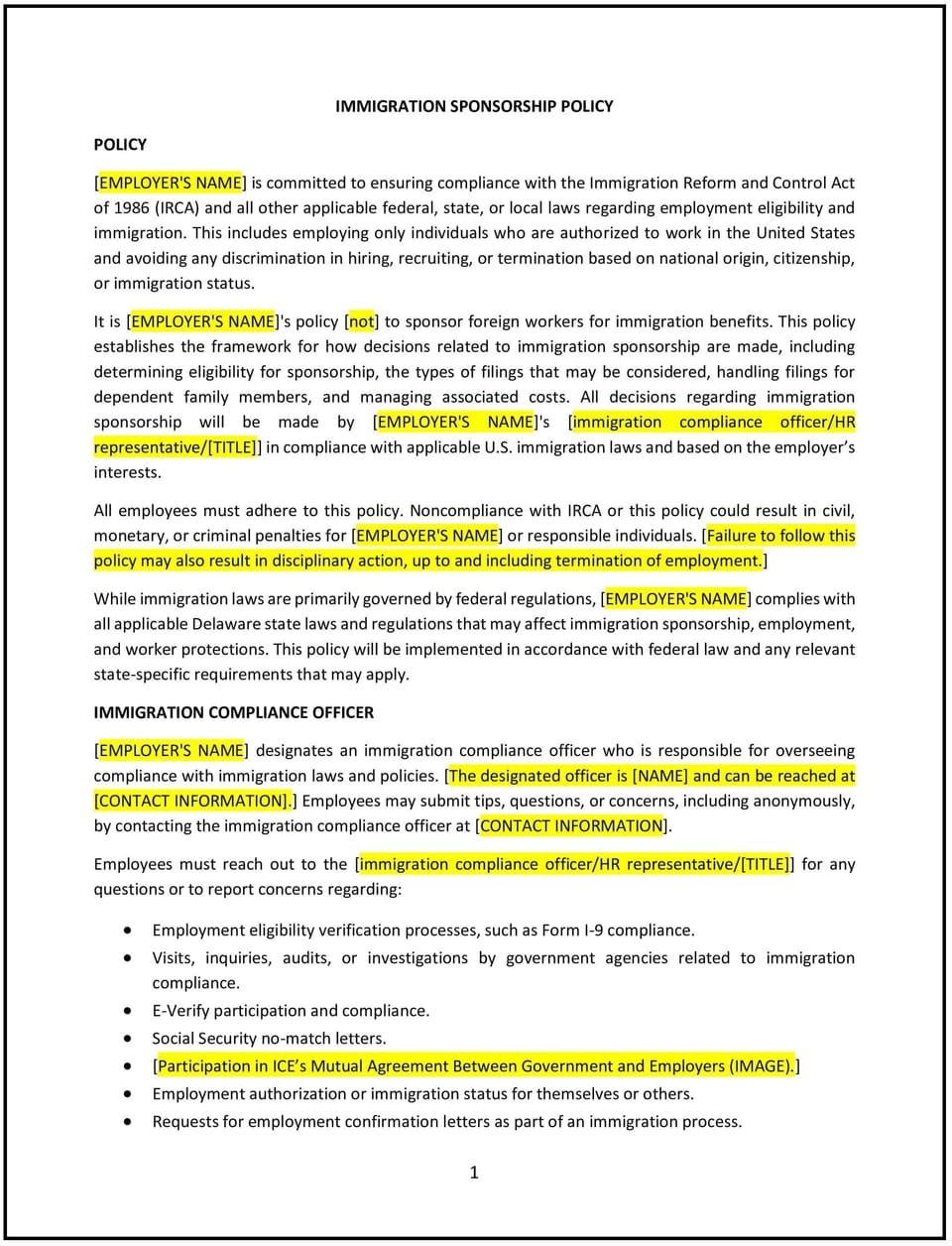Immigration sponsorship policy (Delaware): Free template

Immigration sponsorship policy (Delaware)
An immigration sponsorship policy helps Delaware businesses provide clarity on how the company supports employees or prospective hires requiring visa sponsorship to work legally in the United States. This policy outlines eligibility criteria, sponsorship procedures, and compliance with immigration laws to ensure transparency and fairness.
By implementing this policy, businesses can attract global talent, ensure legal compliance, and foster a diverse workforce.
How to use this immigration sponsorship policy (Delaware)
- Define eligibility: Specify the roles or situations that qualify for immigration sponsorship, such as critical positions or those requiring specialized skills.
- Outline the sponsorship process: Provide clear steps for initiating and managing sponsorships, including application timelines and required documentation.
- Assign responsibilities: Designate roles for managing immigration processes, such as HR or legal teams, to ensure proper handling of applications.
- Ensure compliance: Align the policy with U.S. immigration laws and Delaware labor regulations to avoid legal risks.
- Communicate expectations: Clarify employee responsibilities during the sponsorship process, such as providing accurate documentation and adhering to deadlines.
- Monitor status: Implement procedures for tracking visa applications, renewals, and compliance with employment terms.
Benefits of using this immigration sponsorship policy (Delaware)
This policy offers several benefits for Delaware businesses:
- Attracts global talent: Expands the candidate pool by supporting highly skilled individuals requiring visa sponsorship.
- Promotes transparency: Provides clear guidelines for employees and candidates about the sponsorship process and expectations.
- Ensures compliance: Aligns with U.S. and Delaware immigration laws, reducing legal risks and potential penalties.
- Enhances retention: Demonstrates the company’s commitment to supporting sponsored employees, fostering loyalty and job satisfaction.
- Strengthens diversity: Encourages the hiring of international talent, contributing to a more inclusive workplace culture.
Tips for using this immigration sponsorship policy (Delaware)
- Communicate the policy clearly: Ensure employees and candidates understand the eligibility criteria and sponsorship process.
- Partner with experts: Work with immigration attorneys or consultants to navigate complex regulations and ensure compliance.
- Provide regular updates: Keep employees informed about the status of their sponsorship applications and any changes to immigration laws.
- Track renewals: Implement systems to monitor visa expiration dates and ensure timely renewals to avoid lapses.
- Review regularly: Update the policy to reflect changes in U.S. immigration laws, Delaware labor regulations, or company needs.
Q: Why is an immigration sponsorship policy important for my business?
A: This policy provides clarity and structure for managing visa sponsorships, ensuring compliance with immigration laws and enabling the company to attract top global talent.
Q: Who is eligible for immigration sponsorship under this policy?
A: Eligibility is typically based on business needs, such as critical roles or positions requiring specialized skills that cannot be filled by U.S. workers.
Q: What types of visas are covered under this policy?
A: The policy may include common employment-based visas, such as H-1B, L-1, or O-1, depending on the company’s hiring needs and legal requirements.
Q: What are the employee’s responsibilities during the sponsorship process?
A: Employees are typically responsible for providing accurate documentation, meeting deadlines, and complying with visa conditions outlined in the policy.
Q: How often should this policy be reviewed?
A: This policy should be reviewed annually or whenever U.S. immigration laws, Delaware labor regulations, or business needs change to ensure continued compliance and effectiveness.
This article contains general legal information and does not contain legal advice. Cobrief is not a law firm or a substitute for an attorney or law firm. The law is complex and changes often. For legal advice, please ask a lawyer.


